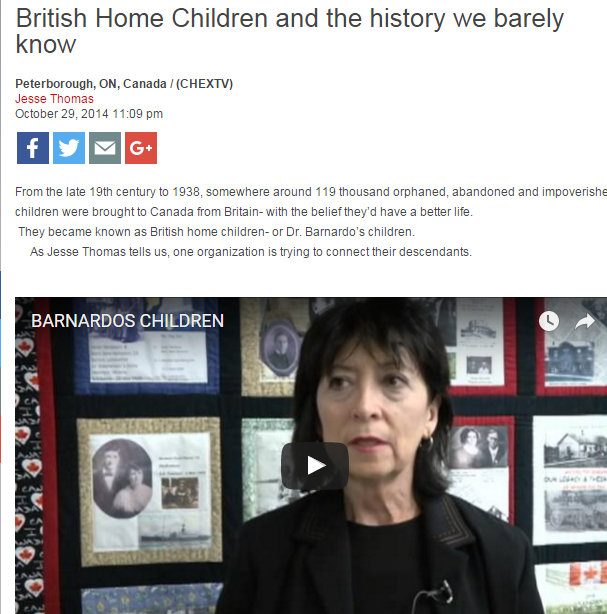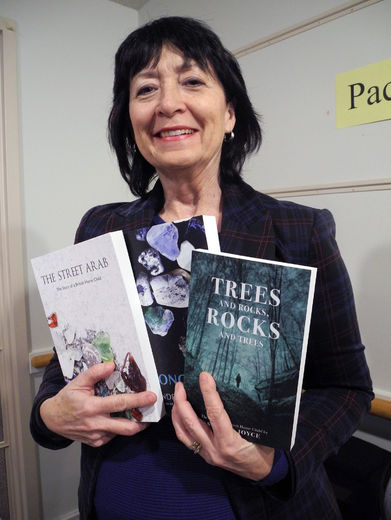http://montreal.ctvnews.ca/legacy-of-british-children-forced-to-come-to-canada-lives-on-1.2878212
Author: admin
Calgary Herald February 2016
Fortney: Remembering the British Home Children

As a child, Sandra Joyce always knew that she was of Scottish descent.
“My dad told me he came to Canada as a teenager, working on farms at first,” she says. “He said his mother passed away, so that’s the reason why he left.”
It would be years before Joyce learned the true story of how her dad, who worked at Seton House in Toronto helping homeless men, made his way to Canada in 1925 as a 15-year-old.
Robert Joyce was one of more than 100,000 children from the British Isles brought here over several decades beginning in the late 19th century, a forced exodus of humanity known today as the British Home Children.
The unaccompanied minors, some orphaned, many more from impoverished families, were brought over to work as farm labourers or domestic servants. While the bulk stayed in Ontario and Quebec, many were dispersed across the country and left in the care of complete strangers.
“I never knew any of my dad’s story growing up,” says Joyce on Friday from her home in Toronto. “He never spoke about it, because of the whole shame factor.”

Today, Joyce is speaking about the story of her father and the British Home Child era through books and frequent stops in cities across the country. On Monday, May 2, she’ll be the guest speaker at an event hosted by the Canadian Federation of University Women-Calgary (cfuwcalgary.ca); she’ll also be at the Calgary Public Library’s Signal Hill branch at 7 p.m. on Tuesday, May 3.
If you had told Joyce a decade ago that in 2016, she would be one of the country’s leading voices on the issue, she wouldn’t have believed it.
“I was writing my first book on my own family experience,” says Joyce, who’ll also be presenting at two Calgary schools during her visit. “I never would have known that it would become such a passion.”
It’s not difficult to understand why such a little known part of our nation’s history would captivate someone with both a professional — Joyce studied journalism at Ryerson University — and personal interest.
According to Library and Archives Canada, between 1869 and the late 1930s, more than 100,000 under-age migrants were sent to Canada from the British Isles. Many believed they were giving the children a chance at a better life.
However, there was little followup done on the young newcomers after they were placed in homes and farms across the country.
According to Joyce, who says the migration in fact continued well into the 1940s, more than 10 per cent of Canadians descend from the British Home Children.
Because of the stigma associated with being an orphan from another country, though, many people today still don’t know their origins.

During the two world wars, thousands of those transplants fought for Canada. Some of it was no doubt because of loyalty to their adopted country. In many cases, though, it was a chance to once again lay eyes on their place of birth.
“It was the only way they could get a free passage home,” says Joyce, “to see if they could find their families.”
In recent years, there has been some recognition of this part of Canada’s history, one that contains both stories of success and tragic tales of abuse.
Both England and Australia, one of the countries where children were sent, offered formal apologies; while Canada declared 2010 the Year of the Home Child and brought out a commemorative stamp, the previous Tory government refused to go that route, saying it couldn’t apologize for, according to then immigration minister Jason Kenney, “everything that’s ever been unfortunate or (a) tragic event in our history.”
“It wasn’t ‘a’ tragic event,” says Joyce. “This was a systematic immigration of children for cheap labour, over a period of 70 years.”
For her part, Joyce has no plans to stop speaking out. Through the international organization British Home Child Group International (www.britishhomechild.com), she and fellow advocates assist people in researching their possible British Home Child roots.
She’ll also continue to travel across the country sharing her own story, one she says has helped her to understand her father and enrich her life as a proud descendent of a British Home Child.
“My father was very distant — he didn’t grow up in a family so never learned how to connect emotionally,” she says. “Knowing why brought healing to me and my family. I now try to help other families find this healing, this sense of belonging.
“And I also now know why he chose to work at a homeless shelter — he understood what those men were going through.”
CJWI Radio Inteview
Follow this link to the CJWI radio interview done prior to a presentation done on Amhearst Island:
Kitchener-Waterloo Record September 2015
Kitchener-Waterloo Record
September 26 by Greg Mercer.
Fanshawe Pioneer Village in London, Ont., will host a gathering for descendants of British Home Children Saturday, Sept. 26, and Sunday, Sept. 27.
It’s believed as many as one in 10 Canadians can trace their ancestry to a Home Child, but those family histories were often suppressed, because the orphans were hesitant to talk about it.
“Many people don’t know about this, because former Home Children felt ashamed of their background,” said Sandra Joyce, an author who’s written several books on the subject. “They were not necessarily treated well by the people they were placed with.”
The gathering will be a chance to share those families’ stories, research genealogy and more, she said.
Joyce’s own Scottish-born father Robert Joyce was left at an orphanage at age nine and shipped to Canada. She didn’t learn he’d been a Home Child until after his death, and it helped her understand her father better.
“Being told they were going to the land of milk and honey, where money grows on trees, and winding up in a place where it’s worse than you were before, it must have been quite the shock,” Joyce said.
“You’d wonder why your family has given you up, I think that’s something you’d carry with you your whole life.”
Guelph Mercury 2014
Wellington County families explore their connections to British Home Children
by Bill Bean, May 21, 2014
“…The shock of dislocation and severance from family, the shame of being identified as worthless and the general lack of nurturing in their new Canadian homes, scarred many of the children, says Sandra Joyce, author and executive director with the advocacy association. The home children then grew up to be adults, who, without having had a good experience of a loving home themselves, tried to be parents of their own families. Like soldiers with post-traumatic stress disorder, they had psychological baggage, but did not talk about it.
Her own father was a home child, which “did clear up some things about my dad.” Joyce recounts a lack of love and connectedness with her father, which left her with “the feeling that I had done something wrong.” After his death, she accidentally learned he had been a home child, not an adult immigrant, who had been left at an orphanage by his own father at age nine, and then shipped to Canada. Understanding that experience helped her deal with her own family life.”
Calgary Herald 2014
 Indentured servants
Indentured servants
Presentation Review: Simcoe Reformer 2016
Toronto author Sandra Joyce spoke at the Eva Brook Donly Museum on Jan. 28, 2016 about British Home Children, the orphans brought to Canada to work on farms. (DANIEL R. PEARCE/Simcoe Reformer)
A Toronto author who has written about British Home Children – orphans brought to Canada in the late 19th and early 20th Century to work on farms – is calling for Ottawa to apologize for allowing the practice.
“An apology is important because it would lead to the reunification of families,” said Sandra Joyce, who has penned three historic-fiction books on the topic.
An official statement from the prime minister would shine a light on the story of the 100,000 children who were brought here from orphanages, said Joyce, who spoke at the Eva Brook Donly Museum on Jan. 28.
That would in turn get descendants of home children thinking and to start looking for lost relatives, she said after speaking to a crowd of about 25 people, some of them descendants of home children.
Joyce didn’t know her father was a home child until after he died. It was during a visit to Pier 21 in Halifax, the point of entry for immigrants to Canada in the 20th Century, that she discovered her dad and his brother had been sent here from an orphanage.
She and her sister did more research and discovered, and visited, long-lost cousins in Scotland while also learning more about her father’s back story.
He had been given up because his father was in the poorhouse while his mother had separated from his father and had “lost interest” in her children, according to the documents they found.
Joyce is a co-founder of an organization known as the British Home Children Group International, which is lobbying for the apology. Four proposed bills have been tabled in the House of Commons but nothing has passed so far, she said.
Life for home children was a mixed bag of experiences, Joyce said. Some were treated well and were made part of the families they lived with. Others had “horrific” experiences.
“The large majority,” she said, “were in the middle, like my dad. My dad was not seen as a child. He was seen as a worker.
“He was not allowed to eat with the family. He was not allowed to speak to the other children. He ran away from three different farms.”
Joyce said her research explained a lot about her father. He didn’t like Scotland, and she could never figure out why.
If the issue of home children had been made public and taught in schools, “may be he would not have been such a reclusive person,” she said. “He was so distant. Maybe we would have had a better relationship. I always felt something was missing, maybe I did something wrong.”
Joyce has researched in detail how the system of home children worked. They were taken to “receiving” and “distribution homes” in Canada before being sent to farms. Her father went to one in Brockville. (One was located in the northwest corner of Norfolk County, said Mary Caughill, chair of the Norfolk Heritage Committee).
“You could order them and could return them if they were not suitable,” said Joyce. “They were kind of like products they could buy and sell.”
Home children are an important part of Canadian history, she said. About 3.5 million Canadians are descended from them or about 10 per cent of the population, she noted.
Daniel R. Pearce
519-426-3528 ext. 529132
daniel.pearce@sunmedia.ca

 Apology would help families: author
Apology would help families: author By
By